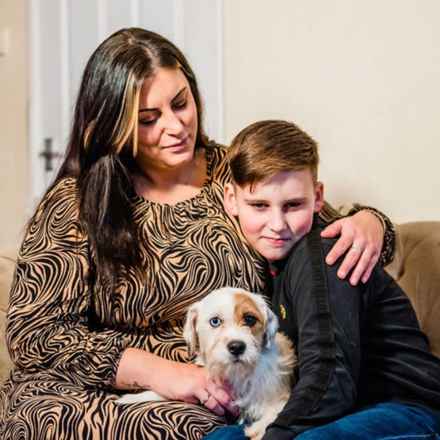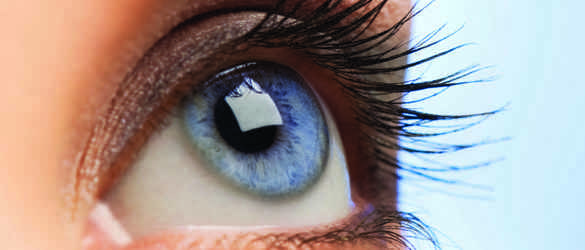“As a mother, it’s one of the hardest things to face”
Posted: Monday 19 June 2023
Ten-year-old Freddie was diagnosed with Stargardt - a rare form of macular disease last year, after teachers initially shared their concerns with his mum Stacy.
“We went to the optician, and he said, ‘I can’t put my finger on it. We’ll do a more in-depth test with an OCT – bring him back tomorrow and my colleague will see him.’ So we came back the next day, and this other optician said he didn’t know what the problem was and suggested Freddie was making it up! I felt like I was going mad, because Freddie was insisting he couldn’t see.”
The optician put a referral into the local ophthalmology department and Stacy took him along.
“When it came to that appointment, I went in naively thinking we’d come away with a prescription for some glasses,” she says. “But the consultant looked into Freddie’s eyes and straight away said, ‘There’s an issue with the retina. He needs a scan.'
“Right there and then, he was certified as partially sighted. And since then, only months later, he’s been registered as severely sight impaired. At 10 years old.”
Before this point, Stacy, like many others, had no idea what macular disease was, let alone that it could affect children.
“It’s been an emotional rollercoaster. At first I thought, ‘No, no, they’ve got it wrong. We’ll go to the hospital and they’ll say ‘Oh it’s not the retina at all, it’s this – you’ll be fine.’ There was a lot of denial. But it’s the cycle of grief that you go through, isn’t it?
“You try to stay strong for your kids, and one minute I’d be fine, looking at things positively; Freddie’s vision is going progressively, so he’s able to adapt gradually. It’s not happening all of a sudden. But on the other hand, I think of all the things he is going to miss. He won’t be able to drive. We knew that on that very first day.
“And there are certain things that are starting to play on Freddie’s mind. Now he’s had the diagnosis, he’s starting to realise what he can and can’t do. He is strong, he’s naturally strong and gets on with things, but I think there’s something bubbling under the surface. We went to the dentist the other week, and my daughter’s teeth were absolutely fine. Freddie though had cracked two of his molars, because he grinds his teeth. We got back in the car, and he was looking out of the window, and I asked him, ’what’s the matter?’ and he said, ‘My life’s rubbish.’ I said, ‘What do you mean, your life’s rubbish?’. He said, ‘Well, my eyes, my teeth.’ That got to me, and Freddie seemed close to tears.
“There will be a point when he will let the tears flow, and I think that will be quite healing for him.
“Freddie’s diagnosis has really impacted the family, but they’ve all been so supportive. I don’t want him to feel like he is completely different, and they aren’t treating him differently – but they’re mindful of his condition. And our dog has been great with him. She’s usually completely bonkers, but when Freddie’s feeling a bit down, she lies at the bottom of his bed while he’s there on his iPad, and she must know because she doesn’t move. She just stays there with him.”
Talking about her hopes for the future Stacy adds: “My hope is that a cure is found for Freddie, whether that’s in five, ten or fifty years. Something that will at least stop the progression. But a complete cure is my ultimate hope.”
Stacy has shared her story as part of Macular Week. To give Freddie and his mum Stacy hope for a cure in Freddie’s lifetime, donate today.
Stargardt disease
Stargardt disease is a genetic condition caused by a tiny alteration in a single gene. It is the most common form of juvenile macular dystrophy.
Support for you
We provide free information and support to those with macular disease, along with their family and friends, to help people keep their independence.




